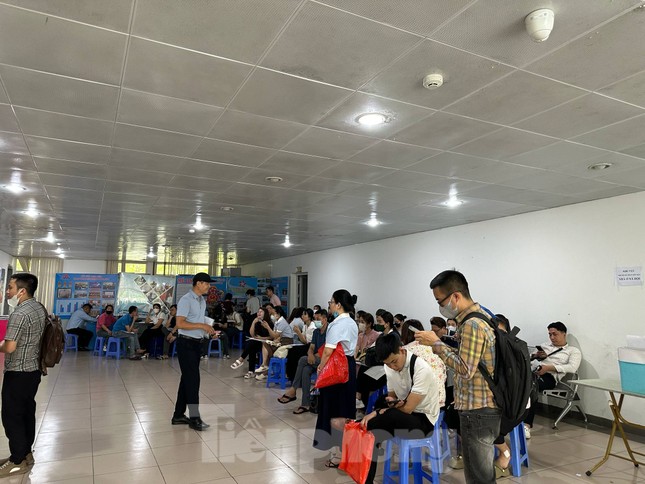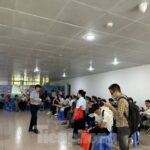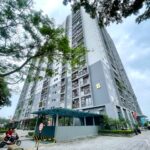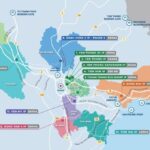The Challenging Journey of Applying for Home Purchase Documents
Ms. Nguyen Kim from Thanh Xuan, Hanoi shared: “Two years ago, I tried to apply for social housing at the Trung Van project in Nam Tu Liem, Hanoi, but couldn’t due to a requirement to have a Hanoi household registration. Now, I’ve learned about an upcoming project in Long Bien that doesn’t require local residency, so I’m determined to try again.”
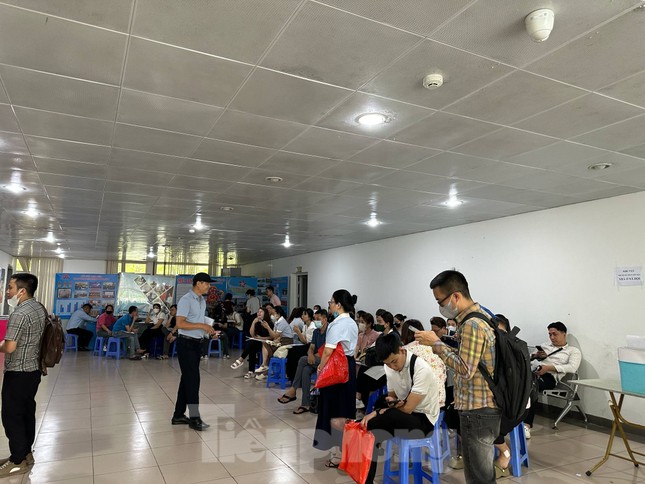
People waiting in line to submit applications for housing status confirmation at the Long Bien Land Registration Office (Photo: Ngoc Mai).
Ms. Kim added that after two visits to the Long Bien Land Registration Office, spaced 20 days apart, she was able to submit her application for confirmation of not owning a house in Hanoi. “Each time, hundreds of people were waiting in line. According to my turn, I was nearly 2,000th in line, and I had to wait until the end of June to receive my confirmation,” she said.
This confirmation is one of the required documents for purchasing social housing. In addition, Ms. Kim also had to prepare other documents, such as confirmation of eligibility and income.
“I thought the housing confirmation would be the most challenging, but verifying my income as a freelancer proved even more difficult because no one was willing to provide confirmation,” Ms. Kim shared.
According to Decree No. 100/2024/ND-CP, individuals applying for social housing must meet the requirements of not owning a house in the project area and having a household income of no more than VND 30 million/month. However, income verification has become a significant obstacle, especially for freelancers.
In reality, not only do applicants face challenges, but local authorities responsible for evaluating and confirming applications also encounter numerous difficulties.
A leader of Thuong Thanh Ward in Long Bien District, Hanoi, shared that there are several social housing projects in the ward accepting applications. Many residents have come to the People’s Committee to request confirmation of low income, but so far, the ward has been unable to process these requests due to a lack of basis for confirmation.
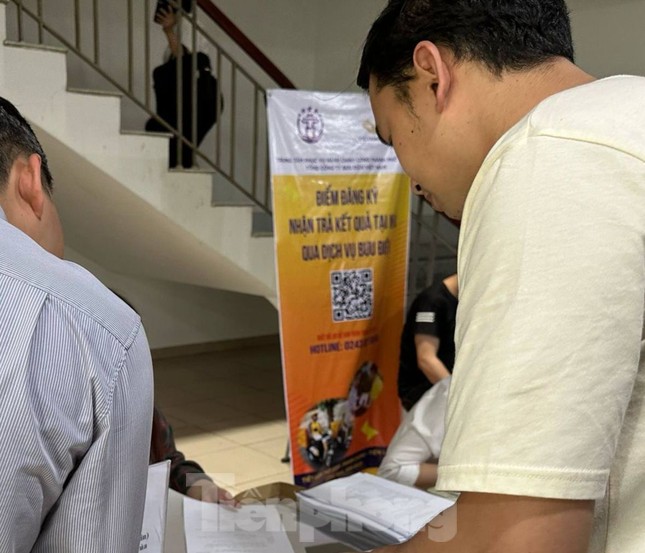
People registering and waiting for their turn to apply for social housing documents (Photo: Ngoc Mai)
Particularly for freelancers, the verification process is even more challenging because they do not declare personal income tax and do not participate in insurance, leaving the ward without a basis for confirmation.
Many applicants feel lost in a maze of paperwork and turn to “middlemen” offering services online.
Ms. Nguyen Thu from Hoang Mai, Hanoi, spent VND 18 million on a “middleman” to “facilitate” her application. “I had no prior experience with social housing applications, so I turned to social media for help. I found individuals who seemed knowledgeable and agreed to pay them,” she said.
When contacted via phone numbers listed on social media, these intermediaries inquired thoroughly about income and employment status. Even if applicants lacked certain documents, the brokers offered to create a “complete and beautiful” application for a fee ranging from VND 10 to 20 million.
Despite the Hanoi Construction Department not yet announcing the receipt of applications from project investors, these intermediaries set their own deadlines. They also demanded immediate payment for their services.
A representative of BIC Vietnam, the investor of the Long Bien social housing project, shared that the company had publicly announced application instructions on its website. However, many individuals still chose to use “middlemen,” resulting in unnecessary expenses.
The representative of UDIC, the investor of the Ha Dinh social housing project, also warned potential buyers to be cautious of unofficial information.
Buyers are advised to seek information directly from investors or state management agencies instead of relying solely on a single source or real estate floor.
Income Regulation Inconsistencies
Mr. Nguyen Long from Cau Giay, Hanoi, and his wife have a combined income of VND 31 million/month. This exceeds the income requirement for purchasing social housing. However, Mr. Long shared: “My wife and I still rent a house, and our family expenses, including those for our child, consume most of our income. With this salary, I am subject to personal income tax, although it is minimal. As a result, I no longer qualify to purchase social housing under the current regulations. Yet, with this income, I cannot afford to buy commercial housing at higher prices. Consequently, our chances of owning a home will diminish as we age or face unforeseen circumstances like illness.”
For many workers, owning a social housing unit in Hanoi is currently out of reach. The selling price of social housing in Hanoi has nearly doubled in five years, while the purchasing conditions have become outdated. The price has increased from VND 10-15 million/m2 to VND 21-25 million/m2, while the price of pre-owned houses has soared to VND 60-65 million/m2.
Meanwhile, the definition of “low-income individuals” in major cities, with a threshold of VND 30 million for a family, is outdated and unrealistic.
Additionally, the complex paperwork makes it nearly impossible for workers to access social housing. In contrast, individuals with higher incomes, who are financially capable, do not meet the eligibility criteria.
Currently, Hanoi has four social housing projects under construction, including the Thuong Thanh project in Long Bien, the Nguyen Xien project in Thanh Tri, and two projects in Dong Anh. These projects are planned to be launched this year. However, the upcoming social housing supply will only meet 20% of Hanoi’s demand.
Purchasing Affordable Housing: From the Agonizing Wait to the Scourge of Property Scalpers
After a long wait, several social housing projects in Hanoi have finally commenced. Though these projects are not yet officially on the market, thousands of people have already lined up to submit their applications, enduring a tedious and challenging process. Some have even resorted to paying extra fees to agents or “middlemen” to handle their applications.
Unveiling Hanoi’s Vision: A Myriad of Residential Projects and Urban Developments in Thanh Tri District
The Hanoi People’s Committee has given the green light to 27 new projects in Thanh Tri district, with a key focus on residential and urban development. Among these projects are the new C3-1 urban area in Dai Ang commune, a modern urban area in Lien Ninh commune, and the Tan Trieu social housing complex. These developments are set to transform the region, offering a host of new opportunities and an enhanced standard of living for its residents.
No Land Taxes When Selling Social Housing After 5 Years of Ownership: A Boon for Residents
After August 1, 2024, once the full payment for the house has been made and the red book is obtained, social housing can be sold after a period of 5 years without having to pay land use fees, but income tax and other charges as stipulated by the law must be paid.
In 2025, Viglacera Aims for a Consolidated Profit of 1,743 Billion VND
With a successful track record in 2024, and leveraging the positive impact of economic governance policies and the government’s efforts to alleviate challenges in the real estate market, Viglacera Corporation – Joint Stock Company has charted an ambitious course for 2025. The company has set its sights on surpassing VND 14,000 billion in consolidated revenue.

